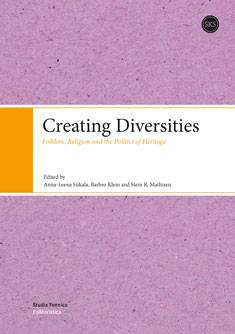Creating Diversities — Folklore, Religion and the Politics of Heritage
Siikala, Anna-Leena; Klein, Barbro; Mathisen, Stein R.Product information
| Title: | Creating Diversities — Folklore, Religion and the Politics of Heritage | ||
| Authors: | Siikala, Anna-Leena (Editor) Klein, Barbro (Editor) Mathisen, Stein R. (Editor) |
||
| Product number: | 9789517466318 | ||
| Product form: | Paperback | ||
| Availability: | Delivery in 7-14 workdays | ||
| Price per piece: | 45,00 € (39,65 € vat 0 %) | ||
|
|||
| Publ. product code: | 1362588 |
| Publisher: | Suomalaisen Kirjallisuuden Seura |
| Series: | Studia Fennica Folkloristica 14 |
| Edition: | 2004 |
| Publication year: | 2004 |
| Language: | English |
| Pages: | 307 |
| Product family: | Folklore and Folkloristics Anthropology Books in English |
| Finnish library classification: | 49.1 Euroopan kansojen kansatiede |
| YSO - General Finnish ontology: | kansanperinne, kulttuurihistorialliset museot, monikulttuurisuus, kulttuurin muutos, paikka, kulttuuri-identiteetti, etninen identiteetti, kansalliset vähemmistöt, representaatio, saamelaiset, alkuperäiskansat, etniset ryhmät, uskonto ja uskonnot, etnisyys |
| Key words: | Immigrants, Globalization, Folklore, Multiculturalism, Ethnic groups |
The effects of globalization and the momentous changes to the political map of Europe have led to a world in which multiculturalism and ethnic differences have become issues of increasing importance. In Nordic countries, relationships between new immigrants, local ethnic groups and majorities are created in ongoing and sometimes heated discussions. In transforming multicultural societies, folklore has taken on new manifestations and meanings. How can folklore studies illuminate the present cultural, political and historical changes?
Creating Diversities. Folklore, Religion and the Politics of Heritage seeks answers to this question. It emphasizes two important factors in the cultural and political exchanges among historical minorities, recent immigrants, and the majority groups dictating the conditions of these exchanges. The first factor is religion, which is a powerful tool in the construction of ethnic selves and in the establishment of boundaries between groups. The second factor is the role of national and regional folklore archives and ethnographic and cultural historical museums which create ideas and images of minorities. These representations, created in different political climates, affect the general understanding of the people depicted.
Fifteen well-known folklorists and ethnographers from Norway, Sweden, Finland, Estonia and the United States offer insights and background material on these problems. In addition to immigrants and ethnic minorities in the Nordic countries, especially the Sámi, examples are sought from among the Finno-Ugrian minorities in Russia and the Nordic population in North America.
Creating Diversities. Folklore, Religion and the Politics of Heritage seeks answers to this question. It emphasizes two important factors in the cultural and political exchanges among historical minorities, recent immigrants, and the majority groups dictating the conditions of these exchanges. The first factor is religion, which is a powerful tool in the construction of ethnic selves and in the establishment of boundaries between groups. The second factor is the role of national and regional folklore archives and ethnographic and cultural historical museums which create ideas and images of minorities. These representations, created in different political climates, affect the general understanding of the people depicted.
Fifteen well-known folklorists and ethnographers from Norway, Sweden, Finland, Estonia and the United States offer insights and background material on these problems. In addition to immigrants and ethnic minorities in the Nordic countries, especially the Sámi, examples are sought from among the Finno-Ugrian minorities in Russia and the Nordic population in North America.





